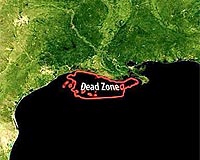 |
Bodo, Nigeria (AFP) July 2, 2010 The waters around the Niger Delta swamps of Bodo are covered in a thick film of oil that has left the once lush mangroves looking like burnt twigs covered in grease. The air reeks of crude. "I struggle everyday," said fisherman Gaagaa Giadom, 60, paddling his blackened canoe through the meandering oil-coated creeks. These days he is forced to cast his nets deep into the high seas to catch anything but still frequently returns home empty handed. "Now you can go for three days without catching anything," added fellow fisherman Mike Vipene, 40. In Bodo, in the famous Nigerian oil-producing Ogoniland, "spills have been occurring for 20 years. But they are getting worse now," he said. Activists claim the environmental crisis in Ogoniland is replicated elsewhere in the Niger Delta, southern Nigeria's oil producing region and home to about a fifth of the country's 150 million people. A 2006 report by international and local experts suggest between nine and 13 million barrels (1.5 million tons) of crude has been spilled in the delta's ecosystem over the past five decades, or the equivalent of roughly 50 times the volume of the 1989 Exxon Valdez spill in Alaska. Oil spills that have stirred outrage over the past two months in the US Gulf of Mexico, are part and parcel of the daily life for the 30 million dwellers of the Niger Delta, one of the world's most oil-damaged areas. The region has in recent years experienced an average 300 spills a year, roughly one spill a day, from terminals, pipes and platforms, according to government officials and experts. "What we have in the Niger Delta is the worst in the whole world, I mean it's worse than what you have in the Gulf (of Mexico)," said Kingsley Chinda, a top environment chief for Rivers State government, a key Nigerian oil producing state. Villagers are resigned to the situation. "We have nothing but oil flowing on our rivers," says a local traditional ruler, Peter Le-ele. "Our fish are dying, our crops are dying even us human beings are dying," he added. At a local market, small crabs and tiny tilapia fish are on sale and buyers bargain hard because prices routinely go up as supplies dwindle. "Oil has spoiled everything, this is coming from abroad, it's from Cameroon," said Theresa Kembe, pointing at the shell fish she is buying. "The air is polluted, the streams are polluted, the land is polluted, everything around here is thriving on pollution," added Chinda. Life expectancy has plunged to between 40 and 45 years in the Niger Delta compared to 50 to 55 in the rest of the country, experts say. "We could say that potentially a lot of Ogonis are impacted by the contamination," said Michael Cowing, project co-ordinator with the United Nations Environmental Programme (UNEP) which is carrying out a scientific study of the extent of the oil pollution in the area. "There are several hundreds contaminated sites of which the majority will be of low importance, low risk to health and environment, although there is a small number of sites which are large in nature and which do represent a significant risk to health and to the environmental quality," said Cowing. Sabotage of oil facilities by armed rebels fighting a fairer share of oil wealth for locals and theft of crude, popularly known as oil bunkering, in recent years saw spills spiking to new levels. Locals and lobbyists blame oil companies' corroding equipment for the leaks. Official records suggest the main cause, around 80 percent, of the spills is not so much due to equipment failure, but oil theft. UNEP says its preliminary observations do "not contradict those findings". Royal-Dutch group Shell, the oldest operator in Nigeria says 98 percent of oil spilled last year was due to vandalism of its equipment or theft. Rights groups such as Amnesty International accuse government, which jointly own oil ventures alongside multinationals, of poor enforcement of regulations on pollution or compensation for affected communities. Environment Minister John Odey, says government recently "tightened its environmental regulations compliance monitoring on oil companies. "Oil companies have also been directed to ensure the integrity of their assets to forestall equipment failure which could cause oil spills," he said. But Bari-ara Kpalap of the local environmental rights group the Movement for the Survival of the Ogoni People (MOSOP) says the Nigerian government was unlikely to follow the lead of the American authorities over the Gulf of Mexico spill. "I am not convinced that the reaction of the US government would actually generate necessary change here. There is a disconnect between the government and the people here," he said.
Share This Article With Planet Earth
Related Links Our Polluted World and Cleaning It Up
 Predict "Larger Than Average" Gulf Dead Zone
Predict "Larger Than Average" Gulf Dead ZoneSilver Spring MD (SPX) Jul 02, 2010 The northern Gulf of Mexico hypoxic zone, an underwater area with little or no oxygen known commonly as the "dead zone," could be larger than the recent average, according to a forecast by a team of NOAA-supported scientists from the Louisiana Universities Marine Consortium, Louisiana State University, and the University of Michigan. Scientists are predicting the area could measure between ... read more |
|
| The content herein, unless otherwise known to be public domain, are Copyright 1995-2010 - SpaceDaily. AFP and UPI Wire Stories are copyright Agence France-Presse and United Press International. ESA Portal Reports are copyright European Space Agency. All NASA sourced material is public domain. Additional copyrights may apply in whole or part to other bona fide parties. Advertising does not imply endorsement,agreement or approval of any opinions, statements or information provided by SpaceDaily on any Web page published or hosted by SpaceDaily. Privacy Statement |